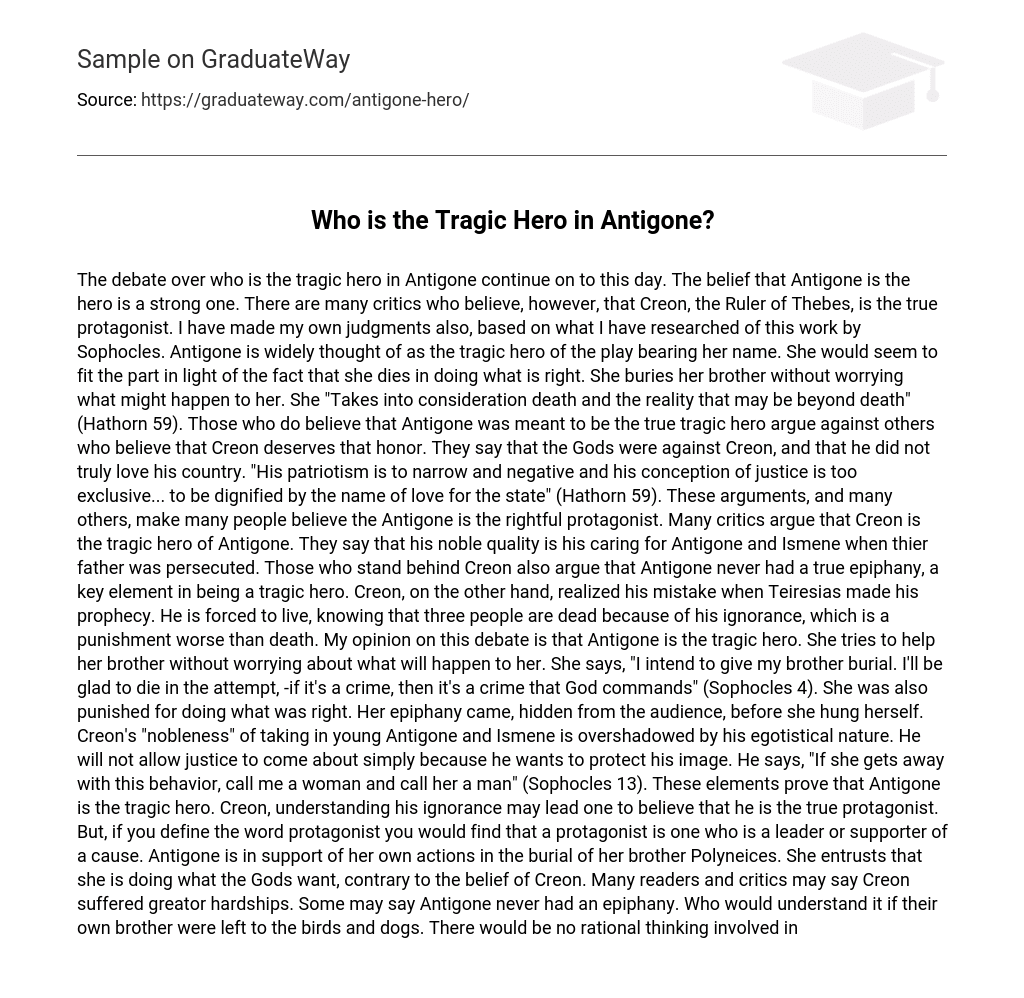The debate over the tragic hero in Antigone remains relevant today. While many argue that Antigone is the hero, others firmly believe that Creon, the ruler of Thebes, is the true protagonist.
After conducting research on Sophocles’ work, I have formed my own opinions. It is generally believed that Antigone is the tragic hero of the play named after her. This perspective is justified by the fact that she meets her demise while pursuing what is morally right. Despite the potential consequences, she fearlessly buries her brother and demonstrates her willingness to confront death and the possibilities it may entail (Hathorn 59).
Those who believe that Antigone was intended to be the true tragic hero oppose those who argue that Creon deserves that recognition. They claim that the Gods were against Creon and that his love for his country was not genuine. “His patriotism is too limited and negative and his understanding of justice is too exclusive… to be described as love for the state” (Hathorn 59). These arguments, among others, lead many to believe that Antigone is the rightful protagonist.
Critics debate whether Creon is the tragic hero of Antigone, contending that his noble quality is exemplified in his care for Antigone and Ismene during their father’s persecution. Supporters of Creon also assert that Antigone lacks a genuine epiphany, which is crucial for a tragic hero. Conversely, Creon experiences a realization of his error upon Teiresias delivering his prophecy. Consequently, he must endure the knowledge that three individuals perished due to his ignorance, an agony surpassing death itself.
In my viewpoint, Antigone is the tragic hero as she selflessly endeavors to assist her brother, disregarding the consequences for herself. She explicitly states, “I intend to give my brother burial. I’ll be glad to die in the attempt, -if it’s a crime, then it’s a crime that God commands” (Sophocles 4). Moreover, she faced retribution for her righteous actions.
The moment of realization occurred in secret, preceding her act of suicide. Creon, despite extending his hospitality to the young Antigone and Ismene, demonstrates his self-centered nature. He refuses to ensure justice solely to preserve his reputation. As he asserts, “If she eludes punishment, consider me a woman and her a man” (Sophocles 13). These factors establish Antigone as the tragic hero, while Creon’s awareness of his own ignorance might mislead one into believing he is the protagonist.
However, if the word “protagonist” is defined, it becomes clear that it refers to someone who is a leader or supporter of a cause. In the case of Antigone, she supports her own actions in burying her brother Polyneices. She firmly believes that she is following the will of the Gods, even though Creon disagrees. It is argued by many readers and critics that Creon endured more hardships.
Some argue that Antigone did not experience an epiphany as it would be difficult to comprehend leaving one’s own brother to the mercy of birds and dogs. Such actions are devoid of rational thinking. These discussions revolve around determining the tragic hero in Antigone.
There is ongoing debate among critics about the tragic hero of Antigone – whether it is Antigone herself or Creon. However, my research supports Antigone as the ideal protagonist.
No matter who the reader sides with, it is agreed by most that there is a valid argument either way, in light of the fact that they both endure great hardships. Charles Woerner Dr. Walton English 12





